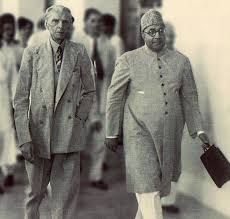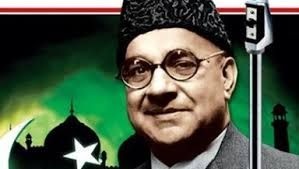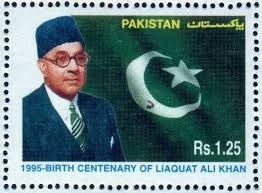
Nawabzada Liaquat Ali Khan, often simply referred as Liaquat, was one of the leading Founding Fathers of modern Pakistan, statesman, lawyer, and political theorist who became and served as the first Prime Minister of Pakistan, he was also the first Defence minister and minister of Commonwealth and Kashmir Affairs, from 1947 until his assassination in 1951. Born and hail from Karnal,East Punjab, Ali Khan was educated at the Aligarh Muslim University in India, and the Oxford University in the United Kingdom. Prior to his return to India, Ali Khan rose to prominence and was also the influential member of the Muslim League led under Mohammad Ali Jinnah, advocating and determining to eradicate the injustices and ill treatment meted out to the Indian Muslims by the British government, and rose as the influential and later was one of the principle Founding Fathers of Pakistan. Ali Khan was invited first to join the Congress Party, but allied himself with the Muslim League, playing a vital role in the independence of India and Pakistan, while served as the Finance minister in the interim government of British Indian Empire, prior to partition. Significantly, Ali Khan and his wife are credited with persuading Jinnah to return to India— an event which marked the beginning of the Muslim League’s ascendancy and paved the way for the Pakistan movement— following the passage of the Pakistan Resolution in 1940, Ali Khan assisted Jinnah in campaigning for the creation of a separate state for Indian Muslims. His influential role led the British Indian Empire to disintegrate into modern-day state of India and Pakistan.
Considered the confident of Jinnah, Ali Khan was appointed first Prime minister, but his government faced eminent challenges and endless regional conflict with India, forcing Ali Khan to approach to his counterpart Jawaharlal Nehru to reach a settlement to end the religious violence, but Nehru pushed for the referral of the problem to the United Nations.[5] Generally an anti-communist, Ali Khan’s foreign policy sided with the United States and the West, although Ali Khan was determined to be a part of the Non-Aligned Movement. Envisaged to established the parliamentary democracy in the country, Ali Khan faced with internal political unrest and also survived coup led by the Leftists and Communists. His influence further grew after the death of Jinnah, responsible to promulgate the Objectives Resolution, and was assassinated in 1951 by a hired assassin Sa’ad Babrak. After his death, Ali Khan is popularly given the titles of Quaid-e-Millat (Leader of the Nation), and posthumously Shaheed-e-Millat (Martyr of the Nation).
On his return from England in 1923, Liaquat Ali Khan decided to enter politics with the objective of liberating his homeland from the foreign yoke. Right from the very beginning, he was determined to eradicate the injustices and ill treatment meted out to the Indian Muslims by the British. In his early life, Liaquat Ali, like most of the Muslim leaders of his time, believed in Indian Nationalism. But his views gradually changed. The Congress leaders invited him to join their party, but he refused and joined the Muslim League in 1923. Under the leadership of Quaid-i-Azam, the Muslim League held its annual session in May 1924 in Lahore. The aim of this session was to revive the League. Liaquat Ali Khan attended this conference along many other young Muslims.
Liaquat Ali started his parliamentary career from the U. P. Legislative Assembly in 1926 as an independent candidate. Later he formed his own party, The Democratic Party, within the Legislative Assembly and was elected as its leader. He remained the member of the U. P. Legislative Council till 1940 when he was elected to the Central Legislative Assembly.
In his parliamentary career, Liaquat Ali Khan established his reputation as an eloquent, principled and honest spokesman who never compromised on his principles even in the face of severe odds. He used his influence and good offices for the liquidation of communal tension and bitterness. He took active part in legislative affairs. He was one of the members of the Muslim League delegation that attended the National Convention held at Calcutta to discuss the Nehru Report in December 1928.
Liaquat Ali’s second marriage took place in 1933. His wife Begum Ra’ana was a distinguished economist and an educationist who stood by her husband during the ups and downs of his political career. She proved to be a valuable asset to his political career as well as his private life. Quaid-i-Azam in those days was in England in self-exile. The newly-wed couple had a number of meetings with the Quaid and convinced him to come back to India to take up the leadership of the Muslims of the region.
When Quaid-i-Azam returned to India, he started reorganizing the Muslim League. Liaquat was elected as the Honorary Sectary of the party on April 26, 1936. He held the office till the establishment of Pakistan in 1947. In 1940, he was made the deputy leader of the Muslim League Parliamentary party. Quaid-i-Azam was not able to take active part in the proceedings of the Assembly on account of his heavy political work; thus the whole burden of protecting Muslim interests in the Assembly fell on Liaquat Ali’s shoulders. Liaquat Ali was also the member of Muslim Masses Civil Defense Committee, which was formed to keep the Muslims safe from Congress activities and to strengthen the League’s mission.
Liaquat Ali Khan won the Central Legislature election in 1945-46 from the Meerut Constituency in U. P. He was also elected Chairman of the League’s Central Parliamentary Board. He assisted Quaid-i-Azam in his negotiations with the members of the Cabinet Mission and the leaders of the Congress during the final phases of the Freedom Movement. When the Government asked the Muslim League to send their nominees for representation in the interim government, Liaquat was asked to lead the League group in the cabinet. He was given the portfolio of finance, which he handled brilliantly. He influenced the working of all the departments of the Government and presented a poor man’s budget. His policies as Finance Minister helped in convincing the Congress to accept the Muslim demand of a separate homeland.
After independence, Quaid-i-Azam and Muslim League appointed Liaquat to be the head of the Pakistan Government. Being the first Prime Minister of the country, He had to deal with a number of difficulties facing Pakistan in its early days. Liaquat Ali Khan helped Quaid-i-Azam in solving the riot and refugee problem and setting up an effective administrative system for the country. After the death of Quaid-i-Azam, Liaquat tried to fill the vacuum created by the departure of the Father of the Nation. Under his premiership, Pakistan took its first steps in the field of constitution making, as well as foreign policy. He presented the Objectives Resolution in the Legislative Assembly. The house passed this on March 12, 1949. Under his leadership a team also drafted the first report of the Basic Principle Committee. His efforts in signing the Liaquat-Nehru pact pertaining to the minority issue in 1950 reduced tensions between India and Pakistan. In May 1951, he visited the United States and set the course of Pakistan’s foreign policy towards closer ties with the West.
On October 16, 1951, Liaquat Ali Khan was assassinated. He had been scheduled to make an important announcement in a public meeting at Municipal Park, Rawalpindi. The security forces immediately shot the assassin, who was later identified as Saad Akbar. Killing the assassin erased all clues to the identity of the real culprit behind the murder. Liaquat Ali Khan was officially given the title of Shaheed-i-Millat, but the question of who was behind his murder is yet to be answered.






